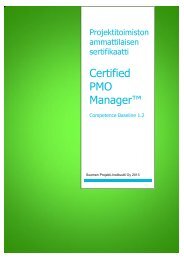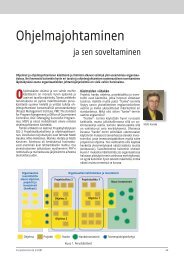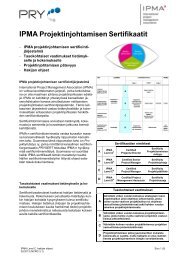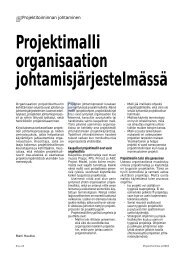Boundary activities and readiness for ... - Projekti-Instituutti
Boundary activities and readiness for ... - Projekti-Instituutti
Boundary activities and readiness for ... - Projekti-Instituutti
Create successful ePaper yourself
Turn your PDF publications into a flip-book with our unique Google optimized e-Paper software.
Results<br />
Legitimating <strong>and</strong> committing <strong>activities</strong> are about making the program<br />
legitimate in the eyes of others <strong>and</strong> getting people in the parent<br />
organization to commit to the program <strong>and</strong> support the program work.<br />
These <strong>activities</strong> may be about actively lobbying <strong>for</strong> support <strong>for</strong> the program<br />
<strong>and</strong> “selling” ideas <strong>and</strong> plans to others, or they may refer to more subtle<br />
<strong>activities</strong>, such as convincing <strong>and</strong> persuasive communication. Similarly as<br />
in the case of positioning <strong>and</strong> negotiating <strong>activities</strong>, some <strong>activities</strong> in this<br />
category are mainly about legitimating <strong>and</strong> some about committing, but as<br />
many <strong>activities</strong> seem to represent both, legitimating <strong>and</strong> committing<br />
<strong>activities</strong> are viewed as one common type. Examples of the <strong>activities</strong> are<br />
given below:<br />
Q29 (Bureau, program manager): ”[The original program owner] took care of<br />
the external relations, meaning that he sold this program to [Bureau’s] top<br />
management <strong>and</strong> acquired the m<strong>and</strong>ate to do this… <strong>and</strong> he also built awareness<br />
of this program.”<br />
Q30 (Chain, program owner): “During the past year, I have probably spent 60–<br />
70% of my work time with this program … we made this one-time ef<strong>for</strong>t to<br />
spread this model to the field <strong>and</strong> to launch it by demonstrating top<br />
management commitment by going through the local units.”<br />
As the third <strong>and</strong> last type of outward directed boundary <strong>activities</strong>,<br />
influencing <strong>activities</strong> are about changing the parent organization. What<br />
makes these <strong>activities</strong> distinct from e.g. legitimating <strong>and</strong> committing<br />
<strong>activities</strong> is that the target of influencing is not within the program’s official<br />
scope, but it is something else within the parent organization. For example,<br />
early experiences from the program work may have effects on the<br />
organizational work practices or on other projects within the organization.<br />
The next quotes provide examples of influencing <strong>activities</strong>:<br />
Q31 (Center, unit manager actively involved in the program): “Unrelated to this<br />
program, since I have responsibility of [a certain area], I have started to gather<br />
ideas on how to launch a good program, how to organize a program… So I have<br />
already started to plan a future program, but I cannot launch that yet since we<br />
need to focus on this one.”<br />
Q32 (Bureau, support team manager): ”This [support project] has also<br />
supported operations management <strong>and</strong> its development in the whole [Bureau]…<br />
It has contributed to the development of the IT support of these processes <strong>and</strong><br />
the processes themselves.”<br />
The last category of boundary <strong>activities</strong> is about blocking the boundary<br />
(Category IV in Figure 12), <strong>and</strong> this category includes two types of <strong>activities</strong>.<br />
Guarding <strong>activities</strong> are about blocking the inwards flows to the program<br />
<strong>and</strong> in this way protecting the program from external influences. In<br />
131









